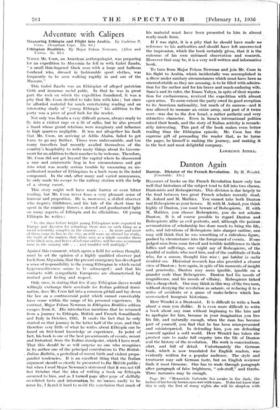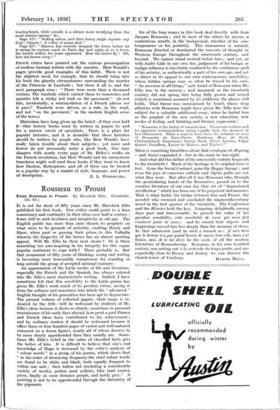Danton Again
READERS of books on the French Revolution know only too well that historians of the subject tend to fall into two classes, Dantonists and Robespierrists. This division is due largely to
the feud between two great French scholars recently dead, M. Aulard and M. Mathiez. You cannot take both Denton and Robespierre as your heroes. If, with M. Aulard, you think highly of Denton, you must beware of Robespierre.. If, with M. Mathiez, you choose Robespierre, you do not admire .
Denton. It is of course possible to regard Denton and, Robespierre alike as evil portents, and, although the patient accumulation of scholarship has done much to bring- the life, acts, and intentions of Robespierre into sharper outline, one • may still think that he was something of a ridiculous .,figure, pushed by circumstance into the foreground of events, If one judged men from some far-off and terrible indifference to their
follies and sufferings, one might say of Robespierre, of the handful of realists who used him, and of the multitude of fools who, for a season, thought him wise : qui habitat in codis irridebit cos. Historical research has also provided a clearer view of Denton ; here again, in spite of his moments of insight and generosity, Denton may seem ignoble, ignoble on a
grander scale than Robespierre. Denton had his moods of magnificence, and his moods of villainy. Robespierre ticked like a cheap clock. One may think in this way of the two men, without decrying the revolution as satanic, or reducing it to a
series of accidents or a game of make-believe which has over-excited bourgeois historians.
Herr Wendel is a Dantonist. It is difficult to write a book
about a inan you dislike. It is even more difficult to write a book about any man without beginning to like him and
to apologise for him, because in your imagination you live his life, and naturally enough, when the man has become part of yourself, you find that he has been misrepresented
and misinterpreted. In defending him, you are defending yourself against a cold world. Hen. Wendel has taken • the greatest care to make full enquiry • into the life of Denton
and the history of the revolution. His work is conscientious, alert, and full of detail. Unfortunately the German book, which is now translated for English readers, ' was ' evidently written for a popular audience. The style and treatment may suit German taste, but an English reviewer finds it most tiresome.' One has to wade through paragraph after paragraph of false brightness, " sob-stuff," and throbs. Three instances may be enough.
Page 30: "Meanwhile 'Gabrielle lies awake in the dark, the lashes of her-lovely brown eyes web with tears. • If she but knew that this is only the first of many nights she will lie sleepless with- beating heart, while outside is a silence more terrifying than the most sinister uproar," &e.
Page 117: " Rolling salvos, and then heavy single reports—my God ! Cannon ! A volley of grape shot."
Page 227: " Penton has scarcely dropped the letter before he is racing by express coach to Paris, day and night, as in a fever, his breath stifled, his heart oppressed. How the horses fly 1 Oh, how the horses creep I "
French critics have pointed out the curious preoccupation of modern German writers with the macabre. Herr Wendel's
pages provide good examples of this habit. There is not the slightest need, for example, that he should bring into his book the ghastly circumstances surrounding the murder of the Princesse de Latnballe ; but there it all is, and the next paragraph runs : " There were more than a thousand victims. The tumbrils which carried them to cemeteries and quarries left a sticky red trail on the pavement." (Is not
this, incidentally, a mistranslation of a French phrase sur is pave? Tumbrils were- driven, as a rule; in the road, and not " on the pavement," in the modern English sense of the term.)
Historians have long given up the belief—if they ever held it—that history books must be written in jargon by and
for a narrow coterie of specialists. There is a place for popular histories, and it is desirable that these histories should-be written by people who, like Herr Wendel, have really taken trouble about their subjects ; yet noise and
horror do not necessarily make a good book. One may disagree with nearly every page of Mr. Belloc's works on the French revolution, but Herr Wendel and his anonymous translator might well read these books if they want to know how Danton, Robespierre, and all of them can be treated in a popular way by a master of style, language, and power















































 Previous page
Previous page